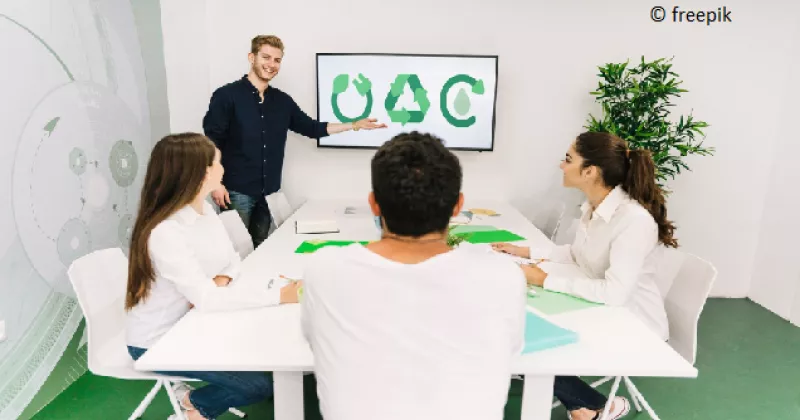Green skills development and awareness-raising in businesses
Authors:
Gergely Hankó, Hungarian Association of Environmental Enterprises, managing director
Károlyné Bedő, Hungarian Association of Environmental Enterprises, social relations coordinator, climate consultant
Hungary has a decades-long tradition of formal and informal environmental education, which focuses on action to protect a liveable environment from the outset. This includes innovations by citizens and teachers, every informative and sensitising content and method that they have used in order to draw attention to the steadily deteriorating state of our planet, the urgency and importance of deliverables and measures to be taken. The first results of this are now being achieved.
Since 2015, this issue has gained a renewed impetus (Paris Agreement, UN Sustainable Development Goals, the EU’s Circular Economy Action Plan) and environmental awareness and mindset-shaping have emerged as expectations also at State level. Environmental education skills are now part of teachers’ competences. A recent national success has been the publication of the Green Earth[1] textbook, which provides a teaching material and a high quality curriculum, and will soon be an optional subject for the secondary school-leaving examination. It can be stated that the foundations are good, and that some of the young leaders who are now taking up their positions (may) already have this background and approach. But what are the next steps?
“Education, as one of the most important socialisation factors, may be a key tool in moving our society towards sustainability and may help shape students' behaviour and attitudes in line with the green economy and society.”[2]
Spinning training background
The organisational framework is provided by educational institutions in Hungary, mainly VET centres (VET 4.0 strategy[3]), demand-driven training and the new occupational register replacing the National Qualifications Register (NQR), as well as Sectoral Skills Councils (Hungarian Chamber of Commerce and Industry)[4] which provide training flexibility and opportunities for further development. In these fora, the relevant professional and social organisations, authorities, ministries and public bodies work to ensure that appropriate training is offered.
From a labour market perspective, a significant step will be the introduction of the so-called “micro-credentials”[5], which will provide evidence of learning outcomes achieved during a short learning process for adults' personal and professional development, and the “individual learning account” in vocational education and training and adult learning, which will be a funding tool providing personalised entitlements and support. Following the publication of the recent government resolution[6], a significant development process will be launched in this area, which may also mean a significant relief for companies in the field of upskilling and retraining, as both tools support the demand-based training system.
In addition, there is a choice of high-quality — and continuously growing — university diploma courses and adult learning programmes, but the certificate issued does not always provide sound knowledge and may not be of practical use for companies. Training courses consisting of a few sessions may provide fresh knowledge and may be used for the development of workers, but their participation in ongoing, developmental training is essential for retraining and for filling positions of responsibility.
One needs to become demonstrably better
A company that is able to develop and sensitise its employees towards sustainability and a systemic approach and performs continuous sensitisation, will be able to meet the challenges of our era more easily and may even gain competitive advantage. As Csaba Kőrösi, President of the UN General Assembly, said in a video message sent to an event organised by our Association (Association of Environmental Service Providers and Manufacturers):
“We ourselves are an integral part of nature. If we plan our investments in such a way to preserve the balance of the natural environment, nature will reward it in the form of services of increasing value. It is a rational decision both in business and social terms and it is worth investing in environmentally sound development and solutions.”[7]
At the same time, the expansion and success of knowledge, skills, technology and economy seem to have been accompanied by a lack of a modern approach and attitude to maintaining the appropriate quality of the human environment in a close-to-balance state, even in the face of changing circumstances (climate change, the COVID pandemic, energy problems, war, etc.).
The Sustainable Development Goals[8] scheme, the European Union’s regulations and directives, which already include environmental, social and governance aspects, are intended to close this gap.[9] One of these is the much-heard of ESG (Environmental, Social and Governance) Framework[10] which takes into account the safety of society, including the environment, from the design stage throughout the company’s operations. The transition to a climate-neutral economy will require and will lead to a radical transformation across a wide range of industries and sectors, and the measures to achieve this need to be supported by accurate data already in the Sustainability Report (CSRD[11], ESRS[12]). For economic operators, this is a major realisation: their operations have numerous ties with the natural and social environment, so they must be aware not only of the strict official standards, but also of their social responsibility. Drawing up the reports requires a high level of expertise, but the measures leading to them, the collection of data, more careful data processing, and greater data security require even more additional resources and effort, which requires the support of the management and an expert with the right competences, skills and knowledge, who is responsible for his/her field and, together with his/her colleagues, applies a systemic approach to this interdisciplinary field.
In the short term, much more sustainability managers, circular economy managers, environmental and bio-engineers, climate experts, EHS (Environment, Health and Safety) managers will be needed to meet the above expectations (and get through the warming with our skins intact). They will be the ones to develop and implement the new taxonomy of corporate governance and will thus play a key role in achieving climate neutrality. Let’s face it, this is no small responsibility.
Employer branding: Cleaning the Tisza river instead of go-karting
At the same time, employer branding also requires more and more attention from companies in order to retain existing staff and attract new ones. So the above sustainability efforts need to be strongly visible also to the outside world and need to permeate everyday life, as the “S” in ESG[13], is increasingly important among young workers. A good example of this is our Association’s survey[14] which demonstrates that job holders prefer to work for a company that applies a green approach and expects this from its workers as well. It is known that, in addition to the above expectation, an “attractive workplace” is also characterised by the fact that most people wish to work for a company that provides sustainable working conditions (e.g. volunteering days, rest room, home office option, health services), but also opportunities for personal development and training.
The quality of companies’ sustainability programmes has improved a lot recently, and in addition to the usual awareness-raising presentations, the range of staff sensitising activities has also included green days or occasionally the creation of green volunteer teams, freely usable volunteering days, plant visits, and the greening of company events and team-building activities (cleaning the Tisza river instead of go-karting).
At some companies, a corporate foundation is set up to support non-profit, civil society actions, so that support is not provided on a stand-alone basis, but is integrated and linked in the long term, developed in parallel with the company's sustainability commitments.
When communicating commitments and actions, attention must be paid to the guidelines on greenwashing[15], so that you only make claims in your corporate communications that you can back up.
First-hand practical examples
Sensitising future workers is also crucial, so professionals in the green industry already give regular presentations at VET centres, universities and in-company training courses[16] to showcase their career paths, the initial self-awareness, skills and abilities at the start of their career and the reasons why they chose a profession that help them do their best to protect the environment and humans or to prevent and manage pollution. Efforts and cooperation for the development of the green economy provide opportunities for the development of dual training for companies and students, for the development of meaningful practice in internships, for the development of thesis topics, through which fresh, young knowledge, creativity and innovation may already benefit the green economy. This is why our Association has created the www.zoldallasportal.hu website which covers this dimension of the green economy, from job search to adult education and volunteering.
The goal is common: educational institutions and companies should provide joint, systemic theoretical and practical training and mindset-shaping, whereby graduates are able to contribute to the preservation of a healthy environmental status and to the sustainability goals of the company. This is also partly addressed in the Green Economy 2021 study volume[17] which has since become a learning material for the above mentioned courses, its updated version will be re-published at the end of the year. Experiences gained so far have been collected on a new website where everyone, from businesses to local authorities, can find sensitising and mindset-shaping opportunities[18].
[12] https://www.bdo.hu/hu-hu/aktualitasok-blog/aktualitasok/elfogadtak-az-europai-fenntarthatosagi-jelentesteteli-standardokat
[13] S = social pillar
[14] https://kszgysz.hu/ginop-munkaero-piac-osszehangolasa/a-projekt-kereteben-elkeszult-a-munkaeropiaci-tanulmanyunk
[15]https://www.gvh.hu/pfile/file?path=/szakmai_felhasznaloknak/tajekoztatok/szakmai_felhasznalok_tajekoztatok_zold-iranymutatas_201217&inline=true
[17] https://kszgysz.hu/ZG2021_ONLINE_valtozat_kszgysz.pdf(pages 160 to 174)





